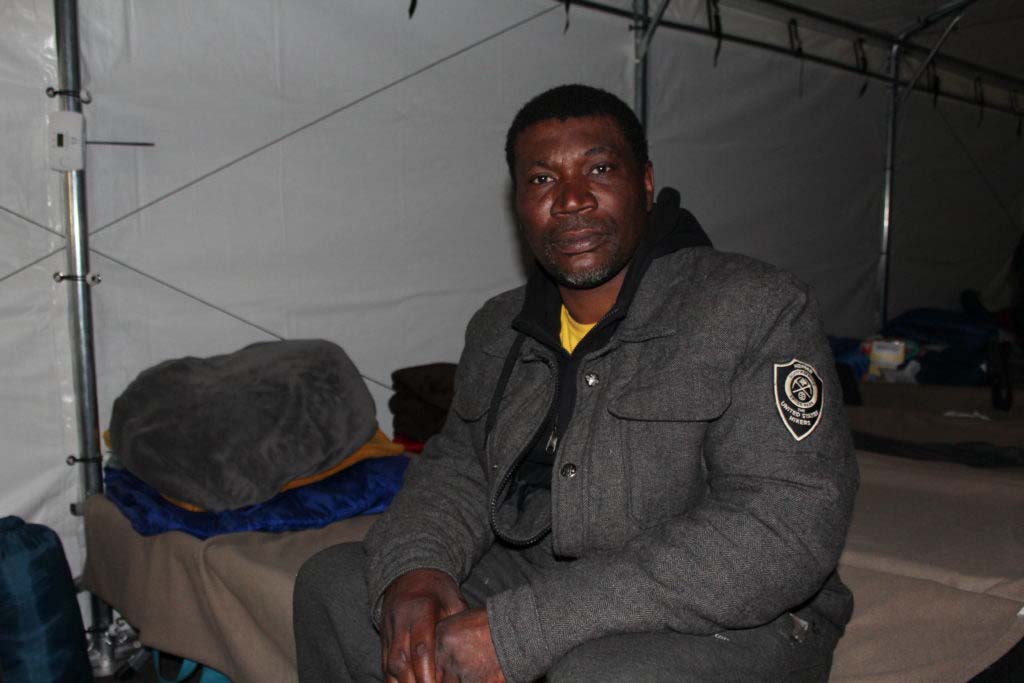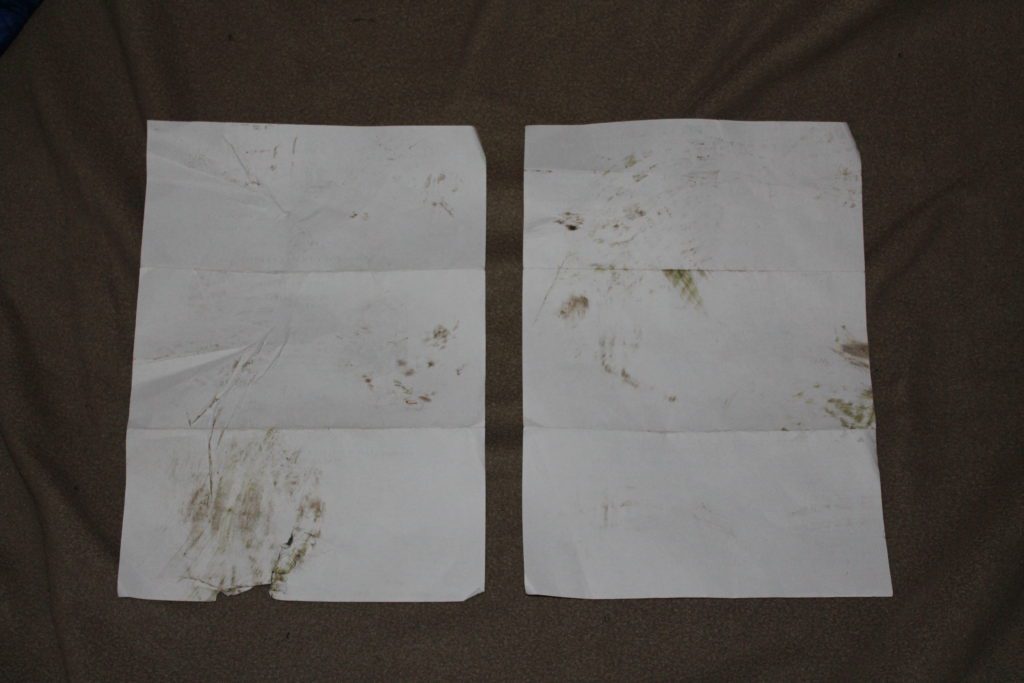
Ukraine: Nigerian Refugee Dragged And Beaten With Kalashnikov By Checkpoint Border Cops
Mark S Redfern travelled to the Polish/ Ukrainian border to hear the stories of refugees fleeing war firsthand and watch the relief efforts unfold.
A Nigerian-national bedding down in a nearby field hospital has spoken of being beaten by Ukrainian border cops while attempting to flee to Poland from war-stricken Kyiv.
Vicious local police snatched and tried to spoil his now boot-printed travel documents also seen by voice.wales.
By Mark S Redfern
A Nigerian man fleeing the war in Ukraine has told voice.wales how he was beaten with a Kalashnikov rifle by a Ukrainian police officer after being dragged away from the Ukrainian border checkpoint.
Nduka Edike, 54, says racism was the cause of police brutality against him as he was forcefully removed after attempting to cross the border from Ukraine and into Poland at the Medyka checkpoint to the east of the war-torn country.
Millions of people have been displaced by the fighting between Ukrainian and Russian forces since the invasion on the 24th February. Many of those crossing the border have fled from the west of the country as Russian troops and heavy shelling swept into Ukraine.
At time of writing the conflict has forced 4.6 million people to flee Ukraine into neighbouring countries, Poland chief among them. Almost 2.7 million refugees have entered Polish territory since the start of the war.
The incident happened in the early afternoon of Thursday 24 March in front of aid workers and a busy line of refugees waiting to be admitted into Poland on the final mile of their flight.
Nduka’s travel documents were snatched from him during the altercation and ground into the pavement by the boot-heel of the Ukrainian cop, as photographed by voice.wales.
Pictures show the boot-print left on the underside of the documents, in what Nduka describes as an attempt by the border cop to destroy the papers for further attempts at entry into the sanctuary country to be refused.

The Nigerian national told voice.wales that he had passed the Ukrainian passport control and was walking towards the Polish control booth when he was recalled.
Nduka told voice.wales: “[At the Ukrainian checkpoint] they were checking, sitting down, writing something, and then after ten minutes they told me to go. After I left I got to the Poland border and I was in the passport control… The Polish immigration official checked my documents and told me it was OK and then that was when the Ukrainian immigration called me back.”
According to Nduka, when he questioned why the cop wanted him to return to the previous checkpoint the police officer started to become irate. The cop told a nearby Ukrainian soldier to take Nduka away, to which the soldier replied by helping Nduka gather his documents off the floor outside of the Ukrainian checkpoint.
Nduka was told by UN officials on the Polish side to stay where he was until assistance came to help negotiate with border officials. The cop wanted him back in Ukraine.
“He threw my papers on the ground and then he wanted to handcuff me. I was arguing with him and then he started stamping on my documents. I asked him ‘Why do you want to spoil my documents?’… The policeman was so angry.”
The cop then dragged Nduka by the scruff of his shirt and beat him in the arm and ribs when he released his grip back on Ukrainian soil. “Then he hit me with a gun,” Nduka said, describing the weapon used as a Kalashnikov. During the interview in the country, Nduka raised his hands wide apart to show how large the rifle was.
According to Nduka this was not an isolated incident, on previous attempts the same officer had been “aggressive”.
“I don’t have a place to stay, I don’t have a place to go. I came from Kyiv. I’m very sad and very angry. What they did to me was racist. I don’t know why they did this to me because I was already gone. I don’t know why they are doing this to a black person. We’re foreigners in this country so they don’t want to allow us to go.”
“I’m in danger now. They could kill me now. I’m afraid… People are worried about me.”
Nduka had been staying in a Ukrainian field hospital since the previous Saturday morning whilst he worked with a United Nations agency to arrange right-to-travel documents after his passport had been lost. He had been staying on a camp-bed with a donated sleeping bag in the field hospital since his arrival as his documents were produced by the Nigerian Embassy in Ukraine.
The original documents had been made difficult to get ahold of due to the Nigerian Embassy in Ukraine being located in the embattled capital city of Kyiv, so assurances had been made by UN and Embassy officials that fax-copies would ensure safe travel through border checkpoints.
The delays and altercation left Nduka feeling distraught to return to the camp he had been living in for nearly a week, having lost hope of getting out of Ukraine any time soon.
Nduka, a 25-year resident of the country, received help from the United Nations International Organization for Immigration (UN IOM) who supplied him with a mobile phone to aid with obtaining the correct documents.
Ömer Yavuz, a Dutch aid worker based in Shehyni, Ukraine who was tasked with helping Nduka, said: “After receiving [his travel documents from the Nigerian embassy], Nduka tried to cross the border on his own. Although he reached Polish soil, he was sent back upon Ukrainian request and violently pushed back across the Ukrainian border by Ukrainian border guards.”
This is not the first instance of racism reported from the border. Reports from the early days of the conflict showed Black and Brown people being barred from entering trains evacuating fleeing Ukrainian refugees from the capital city of Kyiv.
The Ukrainian armed forces are also home to a 900-strong regiment of explicitly neo-Nazi warfighters named the Azov battalion, though members of Azov were not operating in the area at the time.
Over the border in Poland more groups of neo-Nazis could be seen operating around train stations and transport hubs. Local aid volunteers who spoke with voice.wales on the ground in eastern Poland told of neo-Nazi groups attempting to operate around the central train station of the nearby city of Przemyśl, where many direct busses take the majority of refugees crossing the Medyka checkpoint.
Nduka had been fleeing the Russian military shelling of Kyiv when he arrived at the long lines of refugees waiting outside the Medyka crossing. His teenage son had been ordered by the Zelenskyy government to stay behind and fight in the conflict, with Nduka being exempt due to his Nigerian citizenship.
We asked the Ukrainian police force responsible for policing the Medyka checkpoint if brutality against refugees was commonplace in the area. They did not respond to our request for comment.
Volunteers in Medyka, Poland liaised with Nduka to assist him through the checkpoint without further harassment after the altercation.
voice.wales accompanied Nduka and two volunteers on an evening attempt through the border as Nduka was detained by Polish police to validate his immigration status. He was cleared for entry into Poland soon after and has since continued his journey to Warsaw.


